8 Great Sci-Fi Novels That Haven’t Been Made Into Terrible Movies (Yet)
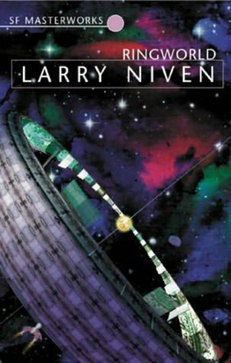 |
One of Hollywood’s all time favorite things to do is take a beloved novel (the bigger the cult following the better) and adapt it for the big screen. In the case of science fiction novels, their process of adaption usually entails stripping the work of all character development and hefty social commentary, peppering explosions throughout, and leaving nothing but the title to connect it to the author’s original vision. Being a genre of ideas, it only makes sense that sci-fi literature is seen as an endless field of box office revenue for studio executives who ran out of ideas long ago.
In good hands, a sci-fi adaptation can be remarkable and even introduce the source material to a wider audience. Take Blade Runner, Planet of the Apes, and Children of Men, for example. In the wrong hands, we’re delivered reprehensible, action-infused dreck like Next or I, Robot. Sci-fi fans have got to be stressed out this year with Gavin Hood’s Ender’s Game in production and Vincenzo Natali’s Neuromancer in preproduction. These are two masterpieces of the genre that have long been deemed unadaptable by fans, so already the film versions are pretty much destined to be hated by rabid geeks.
There are some classics of the sci-fi genre that have managed to doge Hollywood’s proverbial chainsaw. Whether they were optioned and failed to make it past pre-production or were too cerebral to even be considered for adaptation, here’s a look at eight sci-fi classics that have miraculously never been adapted.
8) Dayworld
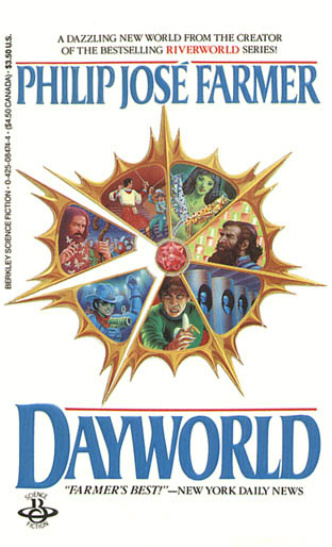 |
Philip Jose Farmer’s dystopian Dayworld is ripe for a Hollywood treatment. They wouldn’t even have to do too much butchering; the plot and main ideas in the novel lend themselves perfectly for a big-budget romp. In Farmer’s 1985 novel, the crippling problem of overpopulation has been remedied by allowing people only one day a week to be alive. During the other six days of the week, people rest in a suspended animation – nicknamed being “stoned.” A rebel group called the Immers have agents known as daybreakers who live more than one day a week to relay information within the organization. Jeff, a daybreaker, lives seven days a week, living seven different personalities over seven different worlds. This forced multiple personality disorder forces Jeff to crack, making him a threat to the Immers. Cue loads of third act chase sequences, ‘splosions, and millions at the box office.
7) Bill, the Galactic Hero
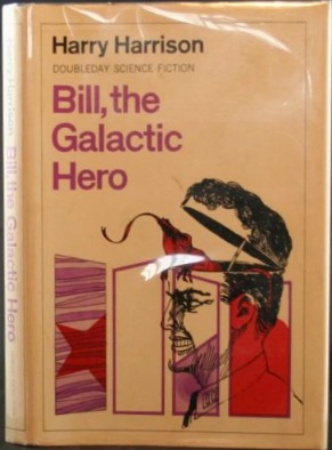 |
Perhaps best known as an illustrator for EC Comics and for his 1966 novel Make Room! Make Room! (later adapted in to Soylent Green in 1973), author Harry Harrison also created one of the most endearing anti-heroes of science fiction in 1985: Bill, the Galactic Hero. Bill was a simple farmboy when he was shangaied into the Space Troopers and forced into battle against the reptilian race of Chingers. Bill goes from being a war hero, to going AWOL, to being a spy, to being a war hero again. Harrison’s military satire spawned several sequels, although Harrison only wrote one of them and was quite underwhelmed by the other five novels. Bill never made it to the big screen though, which is strange because the series’ blend of humor and action make it a prime target for a Hollywood treatment – although it’s a safe bet they’d take out much of the anti-war propaganda and replace it with tits.
6) A Canticle for Leibowitz
 |
Hollywood loves post-apocalyptic movies in which leather fetishist gangs roam around on tricked out dune buggies and rape feral women in the name of rock and roll. Thankfully, there’s no love for post-apocalyptic tales of Catholic priests who preserve literature that survived a global nuclear war. Such is the tale in Walter M. Miller’s A Canticle for Leibowitz, a monumental classic spanning 1,800 years of post-nuclear holocaust in the southwestern U.S. Hailed as one of the best works on nuclear apocalypse since its release in 1960, Miller’s novel tackles the themes of church vs. state against an eerily realistic backdrop. The book has been adapted for radio by both NPR and the BBC, but no film adaptations have ever been attempted. While it’s scary to think of what Hollywood would do to a masterpiece like A Canticle for Leibowitz, you have to admit it would be amazing if the priests rode jet-skis in the desert. Somehow.
5) The Forever War
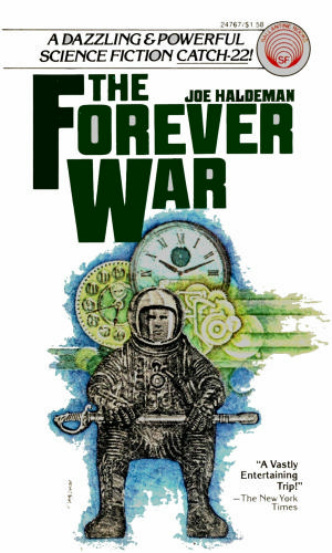 |
When reluctant physics student Willam Mandella was conscripted to an elite U.N. task force created to combat the alien Taurans, who knew that his service would last for centuries? inspired by his own experiences in the Vietnam War, author Joe Haldeman used 1974’s The Forever War to address a lot of what he saw while in the military, including the dehumanizing of soldiers and their alienation upon return to the U.S. Winner of both the Hugo and Nebula award, The Forever War stands as one of the greatest anti-war novels, sci-fi or otherwise, ever written. Movie rights to the book were purchased back in 1997 but thankfully all projects have led to nowhere. Most recently Ridley Scott was attached to direct, but Sir Ridley appears to be attached to a new project every other week (remember his Blade Runner-inspired Monopoly movie?) so I wouldn’t hold your breath for The Forever War to hit theaters anytime soon.
4) Snow Crash
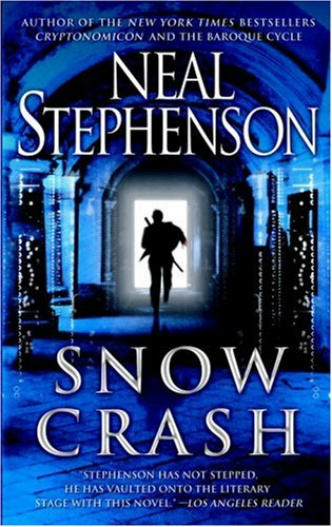 |
Neal Stephenson’s towering 1992 novel of absurdist franchising and freelance hackers is one of those works that has got to be impossible to adapt into a coherent feature film. Audiences would be drowning in ideas without the option of going back a few pages to make sense of bizarre happenings like why a Pentecostal church would be distributing a biolinguistic virus or where the Sumerians fit into all of this. Even with the increasing popularity of MMOs and the use of “avatar” in our common vocabulary, a film version of Snow Crash would tear apart an audiences’ cognition like a Rat Thing through a steak. But like all best sellers, the book was optioned shortly after being published. Since then directors like Jeffrey Nachmanoff (Day After Tomorrow) and Marco Brambilia (Demolition Man) have been attached, but it’s never moved past pre-production.
3) Ringworld
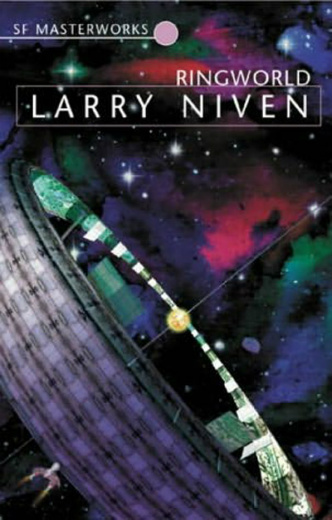 |
Maybe it’s the tremendous scope of Larry Niven’s Ringworld (1970) that’s kept its adaptations limited to videogames. That’s not to say people haven’t tried. There were attempts starting back in 2001 when Niven himself stated that a movie deal had been signed and early planning stages were underway. This first attempt went nowhere. Then in 2004, the SyFy Channel announced they would be developing a four-part Ringworld miniseries; the lack of hybrid shark monsters probably kept this from moving past the earlies stages of development. The always reliable internet rumor-mill has been speculating for a few years that after he’s had his way with Battle Angel Alita, James Cameron will be moving on to tackle the Ringworld. Talk smack all you want, a project like Ringworld — with all of its exotic aliens and massive scope — is right up Cameron’s 3-D alley. Niven himself has expressed his desire to see ALL of his works adapted. While he’s written an obscene amount of short stories and novels, only one of his pieces has ever been adapted: the short story Inconstant Moon was the basis for a 1996 Outer Limits episode.
2) Stranger in a Strange Land
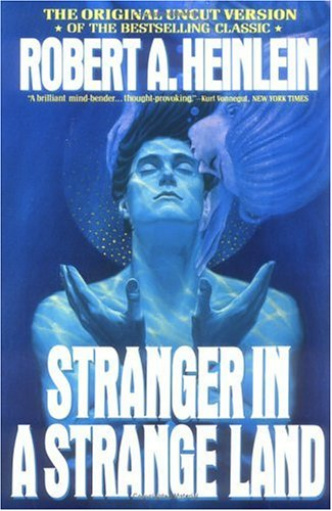 |
Robert Heinlein’s 1961 counter-culture classic Stranger in a Strange Land has been helping humans to grok spirituality, corruption, and sexual freedom since in publication in 1961. The story follows Valentine Michael Smith, a human raised on Mars and brought back to Earth in his 20s. Raised by hyper-intelligent Martians, Smith has difficulty comprehending mankind’s many trappings including religion, war, and sex. He eventually forms his “Church of All Worlds,” based on Martian beliefs. It’s filled with colorful characters, humor, and it’s possibly Heinlein’s most well-known work after Starship Troopers. Sure, the story of a Martian coming to Earth, “sharing water” with gorgeous women, and then forming his own church doesn’t sound too appealing off the bat. But there is plenty of opportunity for lengthy nude scenes and if they got someone like Channing Tatum to play Smith, we’ve got box office gold on our hands.
1) The Demolished Man
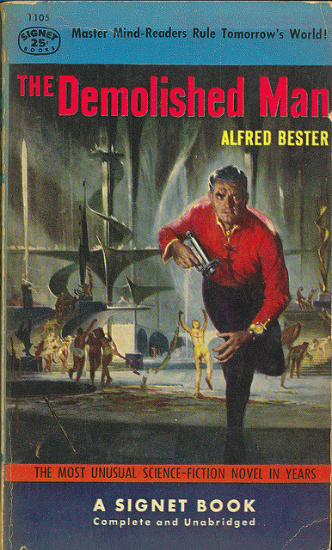 |
Winner of the inaugural Hugo Award in 1953, Alfred Bester’s The Demolished Man has all of the cinematic elements that would please both rabid fans of the genre and a general audience as well. Somehow it’s never made it to the big screen. Preceding the publication of Philip K. Dick’s novella Minority Report by three years, The Demolished Man is also about a future world in which crime has been made obsolete with the help of people known as “peepers” who possess outstanding psychic abilities. A murder hasn’t happened in over 70 years thanks to these peepers who can sense a person’s intentions before they act. But homicidally ambitious businessman Ben Reich sees no choice but to risk it all and murder his chief competitor, peepers be damned. Through an elaborate scenario staged by Reich, he pulls off the “perfect murder.” The remainder of the novel follows Lincoln Powell, Prefect of the Psychotic Division of the police, in his investigation of the homicide. Accompanying the sociocultural examination presented by Bester, the novel also features tons of fluff that audiences fill theaters for: explosions, chase sequences, snappy dialogue, and a grown woman acting like an infant. It’s honestly a miracle this has never been molested by Hollywood.
Director Brian de Palma (Blow Out, The Untouchables) tried to get an adaptation of the book rolling after his success with Carrie in 1976. The book is basically catered for a director like de Palma — someone who loves playing with perception and screwing with your head. Despite being a draw at the box office, de Palma has never been able to raise the funds to adapt The Demolished Man. He’s got to be at least a little bit spiteful over Spielberg’s Minority Report, which cost $102,000,000.
